WA businesses should seek “intangible opportunities” because of China’s grand One Belt, One Road (OBOR) initiative to invest in road, railway, ports and energy ventures to link Europe, Asia and Africa.
Hong Kong Trade Development Council’s Australia New Zealand Director Bonnie Shek told a group of 60 business leaders at CCI’s One Belt One Road business breakfast last week that expertise taken for granted by WA companies on mining projects could be applied to the swathe of infrastructure projects required as part of the plan.
Shek said the soft infrastructure – the knowledge around how to get a project off the ground – can be a valuable export.
“Many of the companies know how to build bridges and ports and all of that but how to handle the soft side, make sure the local people and local businesses are taken care of and the cultural differences are accounted for when these projects are being planned, it’s not something Chinese companies know that well because in China they don’t necessarily have to do that.
“The governments says “we’ll build something here”, so that’s it. Here is quite different – some of the companies that do the oil and gas projects know that you need the locals behind you in order to make it work and these are the things that are intangible, the knowledge and expertise that you have that is very value to these projects.”
She recommended businesses attend the Belt and Road summit, which attracts 3000 people from 50 countries, in Hong Kong on June 28 and establish joint ventures with Chinese companies bidding on large projects.
CCI’s Chief Economist Rick Newnham told the breakfast that while the story of China and WA’s past and present relationship could be told through the seaborne iron ore exported to China for steel, the future should focus on other opportunities.
“The future should be focussed on what can we offer to China and the region in terms of our own expertise, our own value adding products and that’s really where we get to One Belt, One Road,” he said.
“OBOR is now 70 countries that have signed up across six economic corridors with 65 per cent of the world population to be encapsulated by the initiative. At the moment, it’s just 40 per cent of the world’s GDP but the trajectory is pretty strong for those countries.
“This is where the rubber hits the road and that tension between what’s in our economic interest and what’s in our geopolitical interest starts to come into play because the figures here are just too great to ignore.”
Newnham said while the figure of $8 trillion reportedly required for infrastructure spend was already a large one, once the groundwork was laid there would be much greater opportunities for trade with other regions.
“There are grander goals, which are linking up demand from Europe to China. It’s the mentality for a rising tide lifts all boats.”






